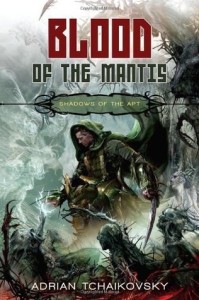 In my reviews of Empire in Black and Gold and Dragonfly Falling, I wrote of how hesitant I was beginning the Shadows of the Apt series. Insects are something that had never really made a presence in fantasy. They’re (mostly) disgusting creatures and the thought of reading a series where the orphan boy has been replaced by all of these bug-like people was a complete turn-off for me. Like I said, I gave it a shot. I couldn’t be happier that I did, especially after Blood of the Mantis. The series is quickly becoming one of the best I have ever read, sitting right next to the Malazan series. What makes me have even more drive to read Apt rather than Malazan is the fact that the books in the latter series are tomes. They’re huge. Tchaikovsky keeps his books at a more feasible length for the most part.
In my reviews of Empire in Black and Gold and Dragonfly Falling, I wrote of how hesitant I was beginning the Shadows of the Apt series. Insects are something that had never really made a presence in fantasy. They’re (mostly) disgusting creatures and the thought of reading a series where the orphan boy has been replaced by all of these bug-like people was a complete turn-off for me. Like I said, I gave it a shot. I couldn’t be happier that I did, especially after Blood of the Mantis. The series is quickly becoming one of the best I have ever read, sitting right next to the Malazan series. What makes me have even more drive to read Apt rather than Malazan is the fact that the books in the latter series are tomes. They’re huge. Tchaikovsky keeps his books at a more feasible length for the most part.
By now, if you’ve read the series at all or my reviews, you know the deal with the different kinden and how they’re all humans with insectoid traits – as well as their Apt and Inapt abilities. The plot from Dragonfly Falling continues, with Achaeos, Tisamon, Tynisa, Thalric, and Gaved tracking the deadly Shadow Box to a remote town in the Wasp Empire called Jerez. Jerez is home to another fantastically unique race, the Skater-kinden. The kinden, like the bugs themselves, have very long limbs and can literally skate across the water. The town is full of these kinden as well as other shady thugs and mercenaries looking to do business in the black market. Nero and Che have traveled all the way to Solarno, a city on the Exalsee that remains free from the grip of the Empire. Solarno distinctly reminded me of Renaissance Italy, with many different factions vying for control over the council that rules the city as well as the way they address eachother, Bella for a woman and Sieur for a man. Stenwold travels to Sarn for the conference he hopes will cement the alliance of the various peoples opposed to the Wasps and Uctebri has his own sinister plans involving the royal family in the capital of the Empire.
As if there weren’t enough characters from the first two in the series, Blood of the Mantis introduces several more brand new characters and races to make even Malazan‘s character count seem insignificant. This can’t be good, can it? Wrong. Tchaikovsky somehow manages to weave the characters into the story with ease, but there are still some hitches. For one, I found that Achaeos should have had a much larger written role than he ended up having. The book as a whole is easier to follow than its predecessors simply because the story is several hundred pages shorter, and compacted very well into a smooth, quick narrative, in which Adrian surprised me again due to the fact that I expected a slow-moving set-up book. While it was clearly a set-up for the sequel, Salute the Dark, it feels like much more than that.
The action continues in the vein of the first two, with the steampunk-style technology providing some awesome scenes, including duels in the sky with aircraft as well as the ambushes and swordfights that Tchaikovsky writes so well. People are not who they appear to be – twists are everywhere and you never know whose loyalty lies where when reading Shadows of the Apt.
The Apt series has introduced some of my favorite characters in fantasy, and something needs to be said about the ambition of Tchaikovsky (or the publisher) to go from debut to ten-book-epic and hit it out of the park. Dozens of unique races, characters and lands all get their own attention in time and the as-yet unnamed world continues to draw me so far in that I had to stay my hand from purchasing Salute the Dark immediately after finishing Blood of the Mantis. I have to say that I would have been pretty upset if I was forced to wait for it, as the ending was cliffhangerish and had me craving more. Luckily the books are pumped out on a fairly quick schedule.
Find Blood of the Mantis on:
Amazon (US)
And find Adrian on Twitter and his website, where there are dozens of free short stories and a fully detailed map of the world.

One thought on “Blood of the Mantis by Adrian Tchaikovsky”